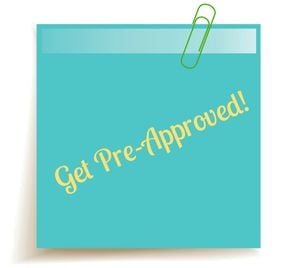Sometimes I forget what it is like to be a first-time homebuyer. I remember buying my first home 10 years ago and didn’t know quite what all to expect. There are numerous things a first-time homebuyer should be aware of before considering to purchase a home and I’d like to highlight some of these. Hopefully it’ll answer some of your general ques tions and put your mind at ease! Although I couldn’t possibly cover every buying scenario, this should cover some of the basics. Even if you have purchased a home before, this could be a good refresher if you haven’t been through the process in a few years.
tions and put your mind at ease! Although I couldn’t possibly cover every buying scenario, this should cover some of the basics. Even if you have purchased a home before, this could be a good refresher if you haven’t been through the process in a few years.
TIPS FOR FIRST-TIME HOMEBUYERS
1) I cannot express enough how important it is to get pre-approved by a lender.
Whenever I get an inquiry about a home from a first-time homebuyer, they seem to only want to talk about things such as: “I found a home I like, can we go look at it ASAP?” or they want to talk about all the fun details: “I want a 3 bed/2 bath home with a fenced in yard, garage, hardwood floors, completely updated…” and so on. Of course those details are important to know. But before we get ahead of ourselves, I always ask the question “Have you talked with a lender? Have you been pre-approved?” It seems that a majority of the time, this question gets answered with a “no” and many times buyers shy away from continuing on with the home buying process. Please believe me when I tell you that the only reason that I ask this question is so that I can provide you with the best possible service!
 Think about it. If you have no idea what you can truly afford, it would surely not be fun to be seriously considering homes that are not within reach. (Don’t get me wrong – it’s still fun to browse the pictures of those high-priced homes and dream about what it would be like to live in a huge mansion. Ahhh….if only we could all win the lottery!) There would be nothing more non-productive and disappointing than to first go out and tour a bunch of $500,000 homes, you get really excited about one and want to make an offer, then you go to the lender and find out that you are only qualified for a loan of $400,000. Sure, you will be able to find a good $400,000 home, but it probably won’t have those extra features you liked in the higher priced home. If you are like me, once I get my mind wrapped on an idea, it’s hard to downgrade. This is the first reason it’s always a good idea to talk with a lender prior to searching for homes.
Think about it. If you have no idea what you can truly afford, it would surely not be fun to be seriously considering homes that are not within reach. (Don’t get me wrong – it’s still fun to browse the pictures of those high-priced homes and dream about what it would be like to live in a huge mansion. Ahhh….if only we could all win the lottery!) There would be nothing more non-productive and disappointing than to first go out and tour a bunch of $500,000 homes, you get really excited about one and want to make an offer, then you go to the lender and find out that you are only qualified for a loan of $400,000. Sure, you will be able to find a good $400,000 home, but it probably won’t have those extra features you liked in the higher priced home. If you are like me, once I get my mind wrapped on an idea, it’s hard to downgrade. This is the first reason it’s always a good idea to talk with a lender prior to searching for homes.
Secondly, in today’s market, most sellers will want to see proof that you have a pre-approval letter when you make an offer (or proof of funds if you are making an all cash offer). This lets the seller know that you are serious and have the funds needed to make the purchase. Furthermore, many homes are going under contract within a day or two of being listed. If you really want to be a competitive buyer, the last thing you would want is somebody else beating you to the punch! While you were delayed in getting your offer submitted because you had to spend time getting pre-approved, others could swoop in, make an offer and get it accepted before you ever had a chance.
The good news is that getting pre-approved is a pretty painless process. Most lenders will direct you to an online form to fill out which should take about 15-20 minutes to complete. The lender can review that information pretty quickly and advise you of what loan amount you are eligible for. Lenders can provide you with a good faith estimate of what you can expect to pay based on the sales price of a home you are thinking about and are qualified to buy. This good faith estimate will break down all the costs you will have to pay upfront and will also give an estimate of what your monthly mortgage payment would look like. After this initial conversation with a lender, you should have a better feel for what you should expect to pay and make you more comfortable as you continue in the home buying process. The lender can also inform you of the types of loans that are available and rates they can offer. I have a terrific group of local Atlanta lenders our Nest Team likes to work with and can refer you their contact information. Contact me for more details!
2) Make a list of what you MUST and what you would LIKE to have in a home.
MUST examples might be – I must have 3 bedrooms and a small backyard for the dog and it can’t be located on a main/busy street. LIKE examples might be – I would like all the windows to have plantation shutters, white kitchen cabinets, and located near a park but it wouldn’t necessarily be a deal killer if I couldn’t find a home with all those features. It’s a great idea to have a general idea of what you are looking for when starting your home search. It’s also important to set realistic expectations. For example – if you want a 2,000 sq. ft. home with marble countertops, high-end light fixtures and appliances, a perfectly manicured lawn, and a 2-car garage in the middle of Midtown for $150,000, you are dreaming!! Ok, so this is an exaggerated example, but you get the point. It’s easy to make a huge wish list but just be cognizant of what the average home in your price range will feature. Typically, similar sized homes having similar features in the same vicinity will sell for a comparable price. Once you start looking at homes, you may get a sense of what you can expect to find in your price range. Perhaps you’ll realize that you’ll have to compromise on a few things or perhaps you will find a gem!
3) Understand the costs associated with buying a home.
 I think many people forget that when you buy a home, there are more costs associated with actually closing on the home than just the negotiated sales price. Don’t forget that there are upfront costs that have to be paid which are summarized as “closing costs.” Besides the down payment, other closing costs include: lender’s fees, attorney fees, discount points (if any are used), appraisal fees, title insurance, and any prepaids/escrow deposits (including taxes & insurance). So how much should you expect for closing costs? Typically, home buyers will pay between 2-5% of the purchase price of their home. So for example, on a $200,000 home, you might pay anywhere between $4,000-$10,000. During negotiations, you may be abe to get the seller to pay for some of these closing costs, which allows you to pay less cash out of pocket. Just remember though, that as a buyer you have to cover your down payment and cannot have the seller pay this portion (as stated in the law).
I think many people forget that when you buy a home, there are more costs associated with actually closing on the home than just the negotiated sales price. Don’t forget that there are upfront costs that have to be paid which are summarized as “closing costs.” Besides the down payment, other closing costs include: lender’s fees, attorney fees, discount points (if any are used), appraisal fees, title insurance, and any prepaids/escrow deposits (including taxes & insurance). So how much should you expect for closing costs? Typically, home buyers will pay between 2-5% of the purchase price of their home. So for example, on a $200,000 home, you might pay anywhere between $4,000-$10,000. During negotiations, you may be abe to get the seller to pay for some of these closing costs, which allows you to pay less cash out of pocket. Just remember though, that as a buyer you have to cover your down payment and cannot have the seller pay this portion (as stated in the law).
Other costs to remember:
- HOA Fees – Check to see if the home you are buying belongs to a Homeowner’s Association (HOA). If so, you will encounter monthly HOA
fees that cover expenses shared by your neighborhood such as lawn maintenance, garbage, pool/park maintenance, etc. Don’t forget to budget this into your monthly expenses. - Inspection Fee – When you buy a home, you’ll want to get an inspection done by a professional home inspector. This can range anywhere from $350-$450. Sure, it sounds a bit steep but you’ll be glad you paid for this in the long run. Your inspector may find items within the home that are serious repair costs and these are items that you can negotiate with the seller to have repaired before you buy the home. This could be a potential money saver into the thousands!
- Moving Costs – Don’t forget to factor in the upfront cost of moving. Maybe you have a lot of nice friends that will be more than happy to spend their weekend helping you move and you don’t have to spend a dime (except maybe to buy your friends some lunch). But if you aren’t so lucky and need to hire a moving company, remember to add in the cost of this charge.
The items I have highlighted above are some of the basics of what to expect and to consider prior to making an offer on your first home. I could go on about other situations to be ready for once you do have that home under contract, but I will save that discussion for a later time. If you are ready to make that first step into buying a home, contact me today and let me help you guide you to your future home!


